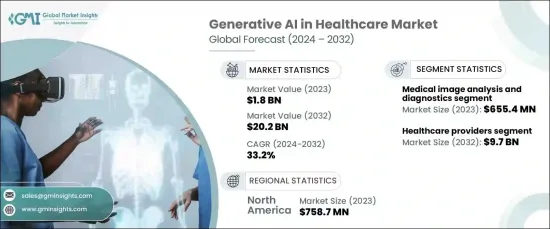
헬스케어 분야 생성형 AI 세계 시장은 2023년 18억 달러로 평가되며, 2024년부터 2032년까지 33.2%의 견고한 CAGR로 성장할 것으로 예상됩니다.
이러한 급성장의 주요 요인은 딥러닝과 자연어 처리(NLP)의 발전, 맞춤형 치료에 대한 수요 증가, AI 기반 헬스케어 솔루션에 대한 투자 증가, 전 세계 헬스케어 데이터의 급증 등이 있습니다.

생성형 AI는 의료 영상 분석, 자동 보고, 환자 참여를 위한 대화형 도구 등 혁신적인 애플리케이션을 가능하게함으로써 헬스케어 산업을 변화시키고 있습니다. 이러한 기술 발전은 의료 서비스 제공자와 조직이 AI 솔루션을 업무에 통합하도록 장려하고 시장 확대를 촉진하고 있습니다.
| 시장 범위 | |
|---|---|
| 시작 연도 | 2024년 |
| 예측 연도 | 2025-2034년 |
| 시작 금액 | 18억 달러 |
| 예상 금액 | 202억 달러 |
| CAGR | 33.2% |
용도별로는 의료 영상 분석 및 진단, 신약 개발, 환자 지원, 맞춤형 치료 등의 부문으로 나뉩니다. 의료 영상 분석 및 진단 분야는 질병을 조기에 정확하게 감지할 수 있는 첨단 도구에 대한 수요 증가로 인해 2023년 가장 높은 수익을 창출하며 시장을 주도했습니다.
생성형 AI는 잠재적인 건강 위험을 조기에 파악하여 진단 능력을 향상시키고, 의료 서비스 제공자가 결과를 개선하고 예방 의료에 집중할 수 있도록 지원하며, AI 기반 도구는 정확하고 빠른 분석을 제공하여 의료 영상 및 진단에 대한 채택을 크게 촉진하고 있습니다.
시장은 최종사용자, 헬스케어 제공자, 제약회사, 의료 지불자 등으로 세분화되어 있습니다. 이 중 의료 서비스 제공자는 2023년에 지배적인 부문으로 부상하여 예측 기간이 끝날 때까지 97억 달러에 달할 것으로 예상됩니다. 이 부문에서 병원, 진료소, 진단 센터는 워크플로우 간소화, 환자 치료 최적화, 스케줄링 및 기록 관리와 같은 관리 업무에 AI를 활용하는 사례가 증가하고 있습니다.
생성형 AI는 반복적인 작업을 자동화하고, 워크플로우 효율성을 높이고, 인적 오류를 최소화함으로써 의료 서비스 제공자의 운영 비용을 절감하는 데 중요한 역할을 합니다. 또한, 이러한 솔루션은 자원 배분을 개선하고 재입원율을 낮춰 궁극적으로 비용 효율적인 의료 서비스 제공에 기여합니다.
북미는 2023년 7억 5,870만 달러로 가장 큰 매출 점유율을 차지했으며, 2032년까지 크게 성장할 것으로 예상됩니다. 이 지역의 첨단 의료 인프라는 전자 의료 기록(EHR), 원격의료 및 기타 디지털 도구의 급속한 도입과 함께 생성형 AI 도입을 위한 비옥한 토양을 조성하고 있습니다. 이러한 요인들은 향후 몇 년 동안 시장 성장을 촉진할 것으로 예상됩니다.
The Global Generative AI In Healthcare Market, valued at USD 1.8 billion in 2023, is projected to grow at a robust CAGR of 33.2% from 2024 to 2032. This rapid growth is primarily fueled by advancements in deep learning and natural language processing (NLP), the increasing need for personalized treatments, rising investments in AI-driven healthcare solutions, and the surging volume of healthcare data worldwide.

Generative AI is transforming the healthcare industry by enabling innovative applications such as medical imaging analysis, automated reporting, and conversational tools for patient engagement. These technological advancements are encouraging healthcare providers and organizations to integrate AI solutions into their operations, driving market expansion.
| Market Scope | |
|---|---|
| Start Year | 2024 |
| Forecast Year | 2025-2034 |
| Start Value | $1.8 Billion |
| Forecast Value | $20.2 Billion |
| CAGR | 33.2% |
In terms of application, the market is divided into segments such as medical image analysis and diagnostics, drug discovery, patient assistance, personalized treatment, and more. The medical image analysis and diagnostics segment led the market in 2023, generating the highest revenue, owing to the increasing demand for advanced tools that enable early and accurate disease detection.
Generative AI enhances diagnostic capabilities by identifying potential health risks at an earlier stage, helping healthcare providers improve outcomes and focus on preventive care. AI-powered tools offer precise and rapid analysis, significantly boosting their adoption in medical imaging and diagnostics.
The market is further segmented by end use, encompassing healthcare providers, pharmaceutical companies, and healthcare payors. Among these, healthcare providers emerged as the dominant segment in 2023 and are expected to reach USD 9.7 billion by the end of the forecast period. Within this segment, hospitals, clinics, and diagnostic centers are increasingly leveraging AI to streamline workflows, optimize patient care, and manage administrative tasks like scheduling and record keeping.
Generative AI plays a crucial role in reducing operational costs for healthcare providers by automating repetitive tasks, enhancing workflow efficiency, and minimizing human errors. These solutions also contribute to better resource allocation and lower hospital readmission rates, ultimately supporting cost-effective healthcare delivery.
North America accounted for the largest revenue share of USD 758.7 million in 2023 and is anticipated to grow significantly through 2032. The region's advanced healthcare infrastructure, coupled with its rapid adoption of electronic health records (EHR), telemedicine, and other digital tools, creates a fertile ground for generative AI adoption. These factors are expected to drive market growth in the coming years.